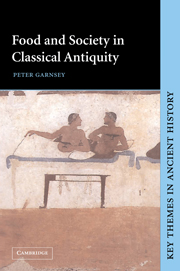Book contents
- Frontmatter
- Contents
- List of illustrations
- Acknowledgements
- Abbreviations
- Preface
- Introduction: Food, substance and symbol
- 1 Diet
- 2 Food and the economy
- 3 Food crisis
- 4 Malnutrition
- 5 Otherness
- 6 Forbidden foods
- 7 Food and the family
- 8 Haves and havenots
- 9 You are with whom you eat
- Conclusion: Choice and necessity
- Bibliographical essay
- Bibliography
- Index
3 - Food crisis
Published online by Cambridge University Press: 05 June 2012
- Frontmatter
- Contents
- List of illustrations
- Acknowledgements
- Abbreviations
- Preface
- Introduction: Food, substance and symbol
- 1 Diet
- 2 Food and the economy
- 3 Food crisis
- 4 Malnutrition
- 5 Otherness
- 6 Forbidden foods
- 7 Food and the family
- 8 Haves and havenots
- 9 You are with whom you eat
- Conclusion: Choice and necessity
- Bibliographical essay
- Bibliography
- Index
Summary
PRELIMINARIES: FAMINE AND SHORTAGE
The Father of Famine Theory, Thomas Malthus, asserted that a violent remedy was needed to adjust galloping population levels to existing food resources, and that was provided (along with war) by famine. His principle of population, and even more so his prescribed remedies for checking demographic growth, have always aroused controversy. The strong definition of famine with which he was working is, however, less vulnerable to criticism, and that concerns me more at present. Famine is, as he implied, catastrophic; it is a food crisis of devastating proportions, bringing in its train a sharp rise in the death rate and social, political and moral dislocation. As such it should be distinguished from, on the one hand, lesser food crises, and on the other, endemic, long-term hunger and malnutrition. These distinctions are not always carefully made. In many historical discussions, ‘famine’ and ‘shortage’ (la famine / la disette) are more or less interchangeable.
One thing at stake in the proper definition of famine is its incidence. When Fernand Braudel, the eminent historian of early modern Europe and the Mediterranean world, wrote that famine ‘recurred so consistently for centuries on end that it became incorporated into man's biological regime and built into his daily life’, he must have had food shortage, not famine, in mind. Shortages were frequent in antiquity. The precipitating cause was often one or more bad harvests. A high degree of variability of crop from year to year, in reaction to low and variable rainfall and fluctuating interannual temperatures, were basic features of the Mediterranean region.
- Type
- Chapter
- Information
- Food and Society in Classical Antiquity , pp. 34 - 42Publisher: Cambridge University PressPrint publication year: 1999



